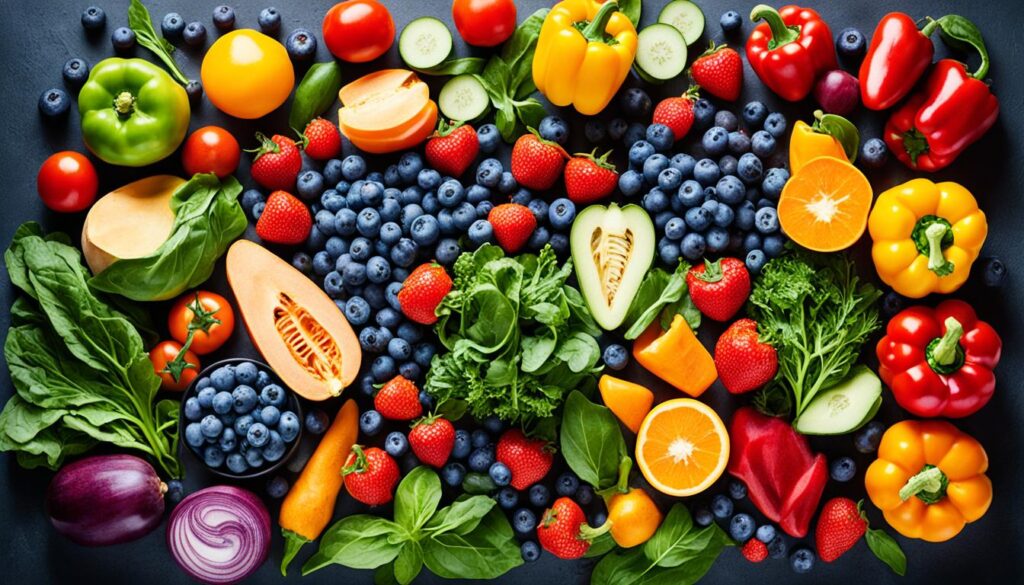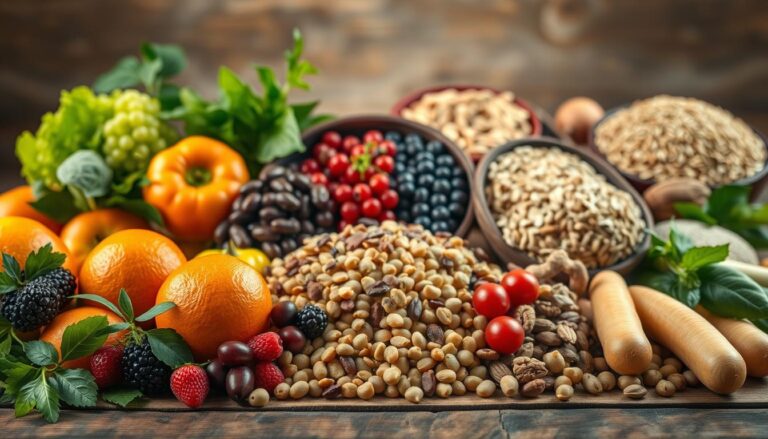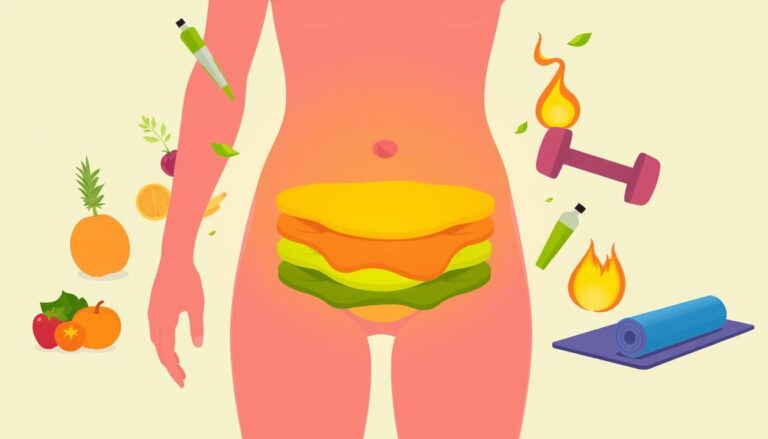Are some of your favorite foods secretly causing inflammation in your body? It’s time to look closer at what you eat and its effect on your health. Inflammation is a complex process that can lead to joint pain and chronic diseases. But, you can control inflammation by choosing the right foods.
Key Takeaways
- Certain foods, like processed foods, alcohol, and red meat, can contribute to inflammation in the body.
- Anti-inflammatory diets, such as the Mediterranean and DASH diets, can help reduce inflammation markers and manage chronic conditions.
- Incorporating more plant-based, antioxidant-rich foods can help combat inflammation.
- Identifying and avoiding personal food intolerances can also play a role in reducing inflammation.
- Lifestyle factors, like exercise and sleep, work hand-in-hand with diet to support an anti-inflammatory lifestyle.
By choosing wisely what you eat, you can fight inflammation and boost your health. Let’s dive into the steps for an anti-inflammatory diet and see how your food choices can make a difference1. Studies show that the Mediterranean diet can lessen inflammation in the heart1. The DASH diet also lowers inflammation markers and may help with arthritis1. A 2017 study found that vegans and vegetarians often have lower inflammation levels than meat-eaters1. Eating more fruits and veggies can help control inflammation, depending on your health and the inflammation causes1.
What is Inflammation?
Inflammation is how our body fights off infections, injuries, or irritations2. It’s key for healing and protecting us. But, if it lasts too long, it can lead to serious health problems like obesity and diabetes2.
Understanding the Role of Inflammation
Inflammation is our body’s defense against harm, like germs or damage2. It starts a complex process to fix the problem and heal2. This response usually stops once the issue is fixed.
Causes of Chronic Inflammation
Chronic inflammation can last for years, often from eating badly, not moving enough, stress, or toxins2. To avoid it, stay away from foods like red meat and sugary drinks2. Also, some cooking methods might increase cancer risks2.
Knowing why chronic inflammation happens helps us fight it for better health2.

Anti-inflammatory Diets: The Key to Better Health
Dealing with inflammation can seem tough, but many diets already follow anti-inflammatory rules. The Mediterranean diet and the DASH diet are great examples. They are known for their anti-inflammatory effects.
The Mediterranean Diet
The Mediterranean diet focuses on plants and healthy oils. It’s a big help in fighting inflammation in the heart3. Studies show it can lower inflammation more than regular diets.
The DASH Diet
The DASH diet is another top choice for fighting inflammation3. It’s all about eating foods full of nutrients and antioxidants. These foods help control inflammation and boost health.
Adding an anti-inflammatory diet to your life can change your health for the better. By eating foods that fight inflammation, you can improve your health and feel the benefits of less inflammation34.

“An anti-inflammatory diet should be a lifestyle, not a short-term fix. By making gradual, sustainable changes, you can experience the long-term benefits of reduced inflammation and improved overall health.”
| Anti-Inflammatory Food | Recommended Intake | Benefits |
|---|---|---|
| Fatty Fish (Salmon, Mackerel, Sardines) | 3-4 oz, 2 times/week | Reduces C-reactive protein (CRP) and interleukin-64 |
| Fruits and Vegetables | 1.5-2 cups fruits, 2-3 cups vegetables per meal | Supports immune system and fights inflammation4 |
| Nuts (Walnuts, Pine Nuts, Pistachios, Almonds) | 1.5 oz daily | Provides anti-inflammatory benefits4 |
| Beans | 1 cup, 2 times/week | Introduces antioxidant and anti-inflammatory compounds4 |
| Olive Oil | 2-3 tbsp per day | Helps lower inflammation and pain due to healthy fats and antioxidants4 |
Adding these anti-inflammatory foods to your meals can greatly improve your health. Remember, an anti-inflammatory diet is a way of life, not just a quick fix. Slow, steady changes can lead to lasting health benefits and less inflammation34.
Top Inflammatory Foods to Avoid
Chronic inflammation can last for months or even years, affecting many health issues like obesity and diabetes2. To fight this, it’s key to know and cut down on foods that cause inflammation.
Experts say to avoid processed and fried foods, red meat, sugary snacks, and unhealthy fats2. This means commercial baked goods, white flour bread, deep-fried foods, and foods loaded with sugar or trans fats2. Instead, choose healthier cooking methods like baking or stir-frying to lower inflammation2.
- Processed sugars trigger inflammatory messengers, so watch out for ingredients ending in “ose”5.
- Saturated fats in pizza, cheese, and red meat can cause inflammation5.
- Avoid trans fats in fast foods, fried items, and processed snacks5.
- Too much omega-6 fatty acids in oils like corn and soy can lead to inflammation5.
- Too many refined carbs like white flour products can make you gain weight and cause inflammation5.
Also, be careful with MSG, gluten, casein, and artificial sweeteners like aspartame, as they can cause inflammation in some people5. Drinking too much alcohol can also harm your liver and cause inflammation, so drink in moderation5.
On the flip side, eating foods rich in omega-3s, vitamin C, and polyphenols can help fight inflammation2. The Mediterranean diet, full of these foods, is great for controlling inflammation2.

By choosing your foods wisely, you can greatly reduce inflammation and boost your health.
Processed Foods: A Hidden Source of Inflammation
The modern Western diet is full of processed foods, which are a big worry for chronic inflammation. These foods often have refined carbs and added sugars, causing inflammation in our bodies6. Americans eat about 17 teaspoons of added sugar daily, way more than the recommended amount6. This can really affect our health.
The Dangers of Refined Carbs and Added Sugars
Refined carbs and added sugars are big inflammation triggers6. They can mess up our gut’s balance, leading to more inflammation7. Also, there’s no safe amount of trans fats, and we should try to eat less than 1 gram a day6. Sadly, some foods still have a lot of trans fat, even if they say they don’t6.
Processed foods have more bad news. Eating a lot of red and processed meats can increase cancer, heart disease, and stroke risks, all linked to inflammation6. Foods high in saturated fats, like these meats, also add to inflammation6.

To fight inflammation, we should eat fewer processed foods and choose whole, nutrient-rich foods instead. Eating foods that fight inflammation can greatly improve our health and well-being7.
Unhealthy Fats: Fueling the Fire
Not all fats are the same when it comes to inflammation. Some fats, like trans fats and some saturated fats, can make chronic inflammation worse8. These bad fats are often in processed foods, fried foods, baked goods, and some animal products. Eating a lot of these fats can lead to health problems, including a higher risk of heart disease and autoimmune diseases.
Healthy fats, on the other hand, can help reduce inflammation and offer many benefits8. Foods like oily fish, nuts, and olive oil are good examples. By eating more of these foods and less of the bad fats, you can fight chronic inflammation and boost your health.
It’s key to pay attention to the fats you eat and choose anti-inflammatory options8. This can lower your risk of chronic inflammation and help you stay healthy. It also supports your immune system and improves your overall well-being.
Inflammatory Foods to Avoid
Red Meat and Its Impact on Inflammation
Reducing inflammation in the body means cutting down on red meat. Studies show that vegan and vegetarian diets can lower body-wide inflammation. This is true if you replace processed foods with fruits, veggies, whole grains, and other healthy foods9. Eating a lot of red meat raises the risk of heart disease and some cancers, which are linked to inflammation9.
For those on an anti-inflammatory diet, eating less red meat and choosing plant-based or lean proteins is key. This diet can help with autoimmune diseases like rheumatoid arthritis and lupus by lowering inflammatory proteins9. It can also ease symptoms of Inflammatory Bowel Disease (IBD) such as ulcerative colitis and Crohn’s disease9.
Choosing wisely about your protein can help reduce inflammation and support your health. Adding more joint-friendly foods to your diet can greatly improve your well-being.

Starting an anti-inflammatory lifestyle can lead to big changes. With creativity and a focus on foods that fight inflammation, you can start your path to better health and wellness9.
Alcohol Consumption: A Double-Edged Sword
Alcohol can have a complex effect on inflammation. Moderate drinking might help reduce inflammation, but too much can increase it, especially in the gut10. This can make conditions like inflammatory bowel diseases worse10. To fight inflammation, it’s best to limit or avoid alcohol.
In the U.S., too much drinking is a big issue, causing 20% of deaths in people 20-4911. The safe drinking limits are 2 standard drinks a week for women and men11. Binge drinking, more than 4 drinks in one go for women or 5 for men, is risky and can lead to addiction11.
Even a little alcohol can mess with your sleep, making it poor quality and affecting your heart health11. There’s no safe amount of alcohol, as its supposed health benefits are not true11. Like cigarettes, alcohol is seen as a carcinogen, which might lead to warning labels on drinks11.
- A study by Kimura Y and Yamamoto R linked alcohol consumption to proteinuria, published in Clin Exp Nephrol (2018)10.
- Tsuruya K and colleagues found a link between high triglycerides and kidney disease, affected by alcohol consumption, in J Ren Nutr (2017)10.
- Kanda E et al.’s study in PLoS One (2015) showed that alcohol and exercise both harm kidney function in healthy men, even if they’re not obese10.
- Hsu YH et al.’s research in BMC Nephrol (2013) found that alcohol might help prevent kidney disease in middle-aged Taiwanese men10.
- WebMD says 20% of people with kidney disease also have diabetes, as noted by Jonathan Himmelfarb, MD10.
The link between alcohol consumption and inflammation is complex. Too much alcohol can increase inflammation and worsen health issues. Knowing this can help people make better choices for their health and reduce chronic inflammation.

Dr. Gabor Mate’s programs help people understand why they drink too much11. Andrew Huberman’s podcast has gotten over 3 million views, discussing how alcohol affects the body and brain11. Even moderate drinking can cause brain thinning due to neurodegeneration11.
Dairy Products: Friend or Foe?
Dairy products have a complex relationship with inflammation. They are a good source of nutrients like calcium and protein. But, some people may be sensitive to lactose or casein in dairy, leading to more inflammation12.
For those who don’t have sensitivities, dairy can be good for an anti-inflammatory diet. But, for people with conditions like inflammatory bowel diseases or autoimmune disorders, dairy might make inflammation worse13. It’s important to watch how dairy affects you and adjust as needed to manage inflammation through diet.
Research is ongoing on how dairy affects heart health. Dairy is a big source of saturated fats, but its effect on heart health varies by dairy type14. Some studies show that eating cheese can lower cholesterol levels, making dairy’s effect on heart health more complex than we thought14.
Deciding on dairy’s role in an anti-inflammatory diet depends on the individual. By paying attention to how dairy affects you and choosing wisely, you can enjoy these nutritious foods while keeping your gut and overall health in check1213.
“Dairy consumption is associated with an excess percentage of cysts, sinus infections, UTIs, yeast infections, and skin problems.”12
| Dairy Product | Potential Impact on Inflammation |
|---|---|
| Milk | Good source of calcium, potassium, and iodine, with higher bioavailability compared to other foods. Can be well-tolerated by those without lactose intolerance or milk allergies14. |
| Cheese | May have a lower impact on plasma lipids and lipoproteins compared to butter. The specific type of cheese can influence its effect on heart health14. |
| Butter | Contributes around 5% to daily average saturated fat intakes, which may contribute to cardiovascular disease risk if consumed in excess14. |
Understanding dairy’s relationship with inflammation and individual sensitivities helps consumers make better choices. This way, they can add these nutritious foods to their anti-inflammatory diets while focusing on their health and well-being.
The Role of Antioxidants in Fighting Inflammation
Antioxidants are key in fighting inflammation. They are found in many fruits, vegetables, and plant-based foods. These molecules can stop free radicals and lessen inflammation in the body15. Eating a diet full of these foods can help control chronic inflammation and boost your health.
Incorporating Anti-inflammatory Foods into Your Diet
An anti-inflammatory diet means eating a mix of foods high in antioxidants. Think of berries, leafy greens, fatty fish, and spices like turmeric1617. These foods can fight off free radicals, cut down inflammation, and help your gut health. This is key for stopping and managing chronic conditions like arthritis, heart disease, and diabetes.
- Berries: Full of polyphenols, especially anthocyanins, berries are known for fighting inflammation and boosting the immune system17.
- Leafy Greens: Spinach, kale, and other greens have lots of phenolic compounds and flavonoids. These can stop harmful molecules and lessen inflammation17.
- Fatty Fish: Salmon, mackerel, and sardines are loaded with omega-3 fatty acids. These can slow down white blood cells moving to inflamed areas and cut down inflammatory cytokines17.
- Turmeric and Ginger: These spices have curcumin and gingerols. They are strong against inflammation, stopping proteins that start inflammation17.
Adding these anti-inflammatory foods to your daily meals helps you fight inflammation and improve your health and well-being.
| Food | Anti-inflammatory Properties |
|---|---|
| Berries | Rich in polyphenols, especially anthocyanins, which fight inflammation and boost the immune system17. |
| Leafy Greens | Have phenolic compounds and flavonoids that stop harmful molecules and reduce inflammation17. |
| Fatty Fish | High in omega-3 fatty acids, which slow down white blood cells moving to inflamed areas and reduce inflammatory cytokines17. |
| Turmeric and Ginger | Have anti-inflammatory properties from curcumin and gingerols, blocking proteins that start inflammation17. |
Adding these antioxidant-rich, anti-inflammatory foods to your diet is a strong way to manage chronic inflammation and improve your health and well-being151617.
Conclusion
Following an anti-inflammatory diet means eating fewer inflammatory foods and more foods full of antioxidants. This can help manage chronic inflammation and boost your health1819. Eating a diet rich in whole, plant-based foods, healthy fats, and few processed items can lessen inflammation’s harm1819.
Stay away from inflammatory foods to avoid like red and processed meats, added sugars, and refined carbs. Add joint-friendly foods full of antioxidants and anti-inflammatory compounds to your meals. This can help fight chronic inflammation and improve your health1819. Talking to health experts can give you tailored advice on the best diet for your health issues. This helps you make smart food choices and reach your health goals.
Choosing an anti-inflammatory diet is a big step towards less inflammation, better health, and a happier life. Focus on eating foods good for your joints and start a path to a healthier, inflammation-free future.





